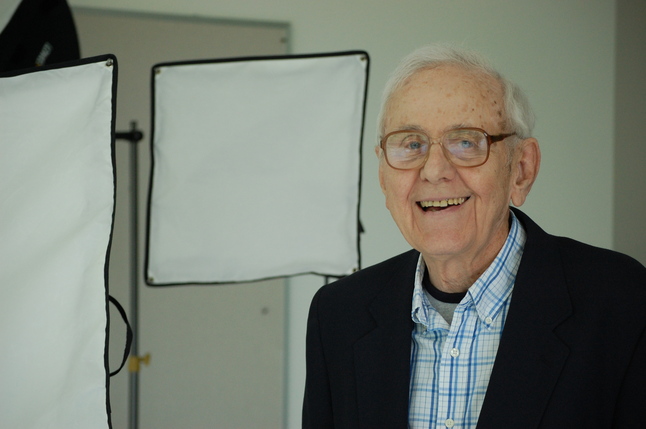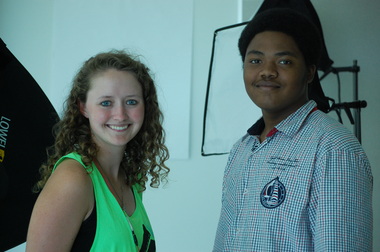Skyline students capture older generations through stories and shared interest

Douglas C. Kelley, 84, of Ann Arbor, participated in the program. He told stories of how he met Eleanor Roosevelt and the early days of the Peace Corps.
Janet Miller for AnnArbor.com
From meeting Eleanor Roosevelt when he was a teenager to being the victim of a racists’ attack in Mississippi during Jim Crow to being on the ground floor when the Peace Corps was formed — needless to say, he's been around the block a couple times.
Now, thanks to a program at Ann Arbor’s Skyline High School, Kelley’s memories won’t be lost to history.
During the past three years and under the direction of Skyline teacher Patricia Jenkins, The Legacies Project has matched about 25 Skyline High School students with area seniors at least 70 years old. It not only teaches students technical and listening skills, it shows them how the history they've learned in the classroom plays out in the real world, Jenkins said.
The students in Skyline’s Communications, Media and Public Policy magnet program work in teams to interview, videotape and edit the life stories of a group of seniors. Those stories, gathered over nearly four hours of interviews, are edited into 3- to 5-minute videos premiering Thursday night at Glacier Hills Senior Living Community.
While colleges, non-profits and businesses have participated in the Legacies Project, Skyline is its first public school-based project, said Jimmy Rhoades, a founder of Nice Work Public Media, the non-profit parent organization of the Legacies Project. It is underwritten by private donations at no cost to the school district, Rhoades said.
The project has a number of goals, including teaching students technical skills and interviewing skills, as well as aiming to empowers the elderly. “Psychologists don’t call it oral history. They call it life review,” Rhoades said. “Participants begin to see the narrative arch of their lives and realize that they’ve done things, that they’ve been on a journey. That’s what the research says. But in talking to the participants, they simply say it’s fun.”

Skyline juniors Maddi Hagan, 16, and Jeramiah Clark, 17, participated in the project where students videotaped the oral histories of a small group of area seniors. It's part of the magnet program at Skyline, Communications, Media and Public Policy. The videos will be shown June 6 at Glacier Hills.
Janet Miller for AnnArbor.com
But, ultimately, it’s meant to bridge the together generations and record stories from an era that’s ending, Rhoades said.
Kelley’s stories spanned from the time he met the former first lady Eleanor Roosevelt in 1946 as part of the first Encampment for Citizenship — where young people from different backgrounds gathered to learn about democratic action and social living — to a decade later when he was attacked on the racially-segregated Mississippi State University campus with a Coke bottle by a young man who didn’t like his liberal views.
While he received seven stitches, Kelley said he learned another lesson when the police weren’t willing to press charges. “I understood at that moment what African Americans had to go through for centuries, assuming that the law was not on your side. That the law was not able to help you.” Kelley said.
While he told stories of his time working for the emerging Peace Corp, his work with the Democratic Party and his career working in continuing education, he left something’s out, Kelley said. “I didn’t get into hitchhiking on my honeymoon in India.”
It’s important to find a diverse group of seniors to tell their stories, Rhoades said, and they recently have reached out to the Islamic Center of Ann Arbor as well as the Jewish Community Center of Greater Ann Arbor. They looked to retirement homes and churches for seniors.
Jeramiah Clark, a 17-year-old junior. said he’s more of a tech-guy, and hadn’t spent much time thinking about the stories of the older generation.
That is, until he sat down with Virginia Sargent. He learned about family secrets, the conflict that came from having one parent who was German while the other was Jewish and Sargent’s elaborate marionette collection. “Usually, like with my grandmother, it’s (the older generation) coming into your world,” Jeramiah said. “But this was the opposite. It was us coming into their world.”
Maddi Hagan, a 16-year-old junior, said she was aware of the differences between her and Hortense Howard, the senior she interviewed. There was age, of course, but also background: Howard was one of nine children in a household where religion was central. But they connected on the subject of music, even though their musical tastes are different. “I have a great passion for music and she had a great passion for music,” Maddi said. “I saw how music affects us in similar ways. She told us how she skipped school once to see a concert. If that time ever came for me, I’d probably do the same thing.”
The idea for the Legacies Project came from Rhoades’ own story. His father was dying when Rhoades realized he wanted to make up for lost time.
“You know how it is: Your parents tell you the same five stories over and over. I wanted to get past the five stories. It was profound and it changed the trajectory of my life.,” he said. While Rhoades listened to his father’s stories, he regrets not videotaping them. But that won’t happen with the participants in the Legacies Project.
There is a publically-accessible on-line video archive of the stories hosted by the Ann Arbor District Library. The Legacies Project continues to look for funding, Rhoades said.
For more information, go to http://www.legaciesproject.org/.
The videos will be shown beginning at 7 p.m. at Glacier Hills, 1200 Earhart Road and is free and open to the public.


Comments
say it plain
Thu, Jun 6, 2013 : 12:34 p.m.
Too bad at Skyline this is *only* part of the magnet program, in which only a few "lucky" students can participate. Too bad AAPS can't work this sort of cool curriculum into more of their classrooms. Another example of how AAPS highlights the increasingly small numbers of interesting and useful educational opportunities, while the majority of their students get poorly-planned and uninspiring instruction.
TryingToBeObjective
Thu, Jun 6, 2013 : 6:52 p.m.
It can be part of the curriculum. Just find yourself a willing teacher. Or, you could get your kid over to the nursing home and make a new elderly friend. Or you could enter the wide open lottery at Skyline. They can't even fill the slots this year. There are fewer applicants every year. Since its Skyline, this in an opportunity to "master" the concept of talking to an elderly person. Lots of options that don't require hand holding by an inept school district.
kris
Thu, Jun 6, 2013 : 1:19 p.m.
Any Ann Arbor student can attend Skyline. Kids apply to the magnet programs at the end of their freshman year. So far, in the fifth year of the program, every kid who has wanted to join the CMPP magnet (the focus of this article) has gotten in.
TryingToBeObjective
Thu, Jun 6, 2013 : 12:23 p.m.
Community High does something very similar in their US history class. Do Pioneer and Huron also have this connection with the elderly? It's good to see, especially for those who do not have grandparents still with them.